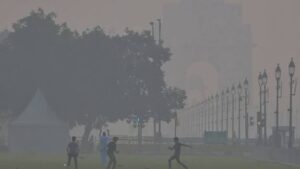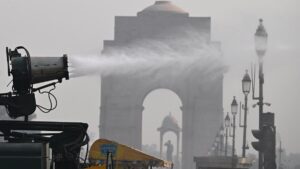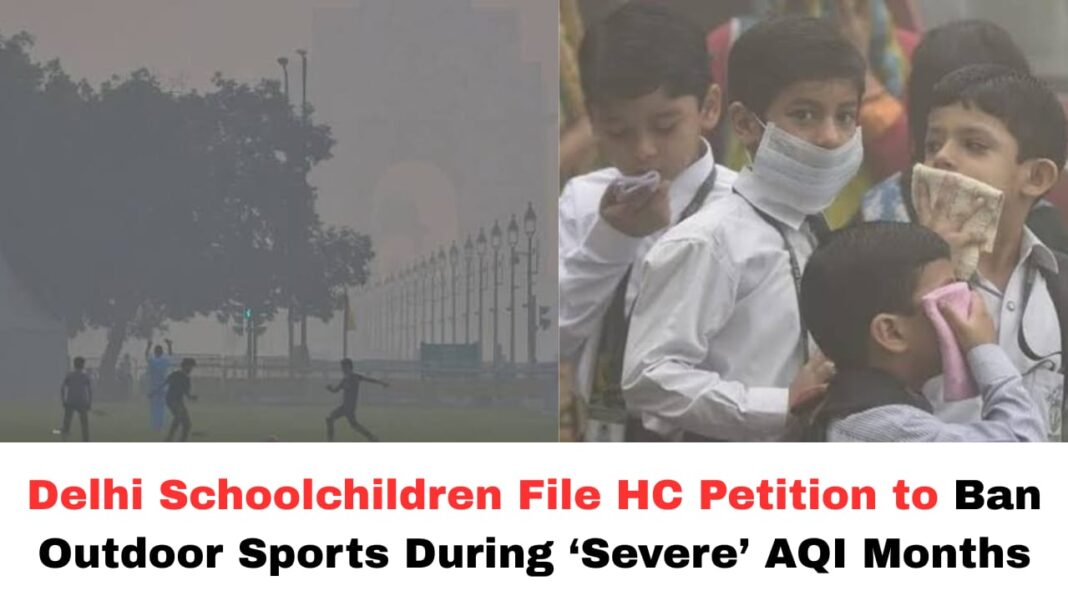Digital New Guru New Delhi Desk:
Delhi Schoolkids Move High Court to Halt Outdoor Sports in Peak Pollution Season
A group of schoolchildren in Delhi has brought a bold case to the Delhi High Court, asking authorities to reconsider how and when outdoor sports events are scheduled. Their petition centers on a simple yet powerful argument: holding strenuous outdoor physical activity during November to January—when the city’s air quality regularly deteriorates to “severe” or even “hazardous” levels—poses a serious risk to their health.
The Petition
Filed through their parents by 11 minor students, the petition (Nyasa Bedi & Ors. vs Government of NCT of Delhi) seeks a judicial direction to the Delhi Directorate of Education and the School Federation of India Games. Specifically, the students want the annual calendar for all outdoor sporting activities—zonal, inter-zonal, state and national tournaments, trials, and coaching camps—to be rescheduled away from the critically polluted months. In their plea, they note that despite ample scientific data and repeated public awareness of Delhi’s winter air crisis, authorities continue to hold such events during the worst months.

Health Risks & Vulnerability
The students’ lawyers argue that children are particularly vulnerable. During physical exertion, their breathing rate increases, and they often breathe through the mouth—bypassing the nasal filtration system, which would otherwise help filter out particulate pollutants. This deeper inhalation of PM2.5 (fine particulate matter) can push more toxic particles deeper into their lungs.
The petition cites medical studies and assessments by health experts (including from India’s Ministry of Health and global organizations like WHO) to underscore long-term risks. According to the plea, exposure at these levels can lead to reduced lung growth, cognitive impairment, and acute cardiovascular strain in children.
Legal & Constitutional Arguments
Legally, the petitioners argue that the state’s actions violate fundamental rights guaranteed by the Constitution—specifically, Article 21 (right to life) and Article 21A (right to education).
Further, they claim that by scheduling these events every year in such hazardous conditions, the authorities are acting in a way that is “arbitrary, unreasonable, and negligent.” The students also invoke other constitutional principles: the State’s duty under Article 39 (directing the government to ensure children’s health) and Article 47 (duty to raise the level of nutrition and the standard of living). Their plea also references the National Education Policy (NEP), suggesting that planning for physical literacy must not come at the cost of children’s health.

Historical Context & Precedent
The petition points out that this is not just theoretical concern — in November 2023, Delhi’s Directorate of Education had itself suspended all outdoor sports citing the health and safety of students. But, according to the petition, that suspension was later revoked, and sporting events resumed in the same high-risk months in subsequent years.
At the time of filing, the petition notes, Delhi was under GRAP-III (Grade Response Action Plan) — an emergency response to severe pollution — with risk of escalation to GRAP-IV. GRAP is a framework used in the Delhi-NCR region to trigger pollution-control actions based on air quality readings.
Why This Case Matters
This case, if successful, could force a significant rethink in how school sports are organized in Delhi — and possibly set a precedent for other cities dealing with seasonal air-quality crises.
- Children’s Health Over Competition: The petition highlights that while sports and physical education are vital, they should not come at the expense of children’s long-term health.
- Policy Change: A court order could push the Directorate of Education and sports federations to design a safer, pollution-aware sports calendar.
- Rights-based Accountability: The case frames air pollution not just as an environmental issue, but as a rights violation, especially for a vulnerable population.
Challenges and Counterarguments
Of course, the path forward may not be straightforward.
- Logistical Complexity: Rescheduling state-level and national-level sports events is not trivial. Dates are often tied to academic calendars, other tournaments, and institutional planning.
- Enforcement: Even if the court gives directives, ensuring compliance across all schools and district bodies could be difficult.
- Balancing Act: Authorities might argue that banning or postponing all outdoor sports in winter could hamper youth development or restrict opportunities for talented young athletes.

Broader Environmental Concern
This legal plea comes amid a growing chorus of concern about worsening air pollution in Delhi. Earlier this month, the city enforced GRAP Stage III, triggering stricter anti-pollution measures. Meanwhile, some schools have already shifted to hybrid models or restricted outdoor activities to protect young children.
Public health advisories also recommend limiting—or even rescheduling—outdoor activities for vulnerable groups on days with poor air quality.
What’s Next
As the court reviews the petition, several outcomes are possible:
- Court grants relief: The High Court could order the Delhi government and school-sports authorities to revise their calendars.
- Partial relief: The court might ask for guidelines or draw up a framework that balances sports and health, rather than an outright ban.
- Rejection or delay: The case could be dismissed or delayed on the grounds of administrative burden, planning, or other legal technicalities.
In any case, the petition has already brought attention to a critical issue: children, especially those who train and compete, are paying the price for Delhi’s winter smog in a very literal sense. Whether through legal reform, policy changes, or public awareness, the case could force a reckoning on how we treat both our environment and our youth.
You May Also Read: Cloudflare Outage Disrupts X, ChatGPT & Dozens of Major Websites








